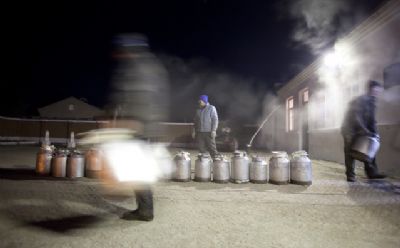Nestle Boosts Milk Production in China After Scandal Hurts Rival MengniuNestle SA (NESN) will spend 2.5 billion yuan ($396 million) with a local Chinese government and investors to boost output in its biggest China dairy district after tainted milk from competitor China Mengniu Dairy Co. hurt consumer confidence. The investment over the next five years will be used partly to create a dairy farming institute in Shuangcheng city, northeastern China, allowing the Swiss company to help farmers produce better quality milk and modernize methods, Nestle Greater China Chairman Roland Decorvet said. The company, the world’s largest foodmaker, also plans to expand capacity by investing as much as 600 million yuan in the next two-to-three years, said Heiko Schipper, managing director for Nestle Food & Beverage in Greater China. “This will transform how raw milk is produced and how dairy farms are managed and the consequence will be more milk and better milk,” Decorvet, who is also chief executive for the region, said in an interview in Beijing yesterday. “We need to do more to communicate the milk we have in China is 100 percent safe and is the best quality.” The announcement comes amid renewed food-safety fears after toxins were found in milk products of Mengniu, the country’s largest dairy company. The latest scandal, three years after contaminated local infant formula killed six babies, has damaged consumer confidence in China’s domestic dairy industry and may help win customers for foreign companies such as Nestle, H.J. Heinz Co. (HNZ) and Mead Johnson Nutrition Co. Nestle, which makes Nescafe instant coffee, Kit Kat candy bars and Polo mints, has been investing in Shuangcheng for more than two decades. The company estimates that the overall milk production will grow between 8 percent and 10 percent a year in volume and “all these investments will allow us to grow our business even more,” Decorvet said. The Shuangcheng factory has close to 100 people in testing and monitoring and has a “very sophisticated” test capability, said Jonathan Dong, a Beijing-based spokesman. The Vevey, Switzerland-based company is the global leader in infant nutrition, the fastest-growing segment of the packaged-food industry. It has lost market share in China since 2005, when it withdrew two varieties of Neslac milk powder because authorities found they contained too much iodine, prompting a local boycott. Nestle aims to regain market share in the world’s most populous nation and hopes to become a top three company in China’s infant nutrition market in about five years, Schipper said in an interview. This will be mainly achieved without acquisitions, he said. China Overtaking France Nestle also expects China sales to surpass France within five years, Decorvet said. Nestle’s No. 1 market is the U.S., he said. Mead Johnson Nutrition Co. (MJN), the baby-food maker based in Glenview, Illinois, had a 12 percent share of China’s milk formula market in 2010, Danone had 10 percent and Nestle 2.3 percent, Euromonitor International said. Closely held Hangzhou Beingmate Group Co. had 9.2 percent and Yili had 7.9 percent, the researcher said. China’s baby-food market will grow about 22 percent to more than 68 billion yuan in 2011 and will almost double to 136 billion yuan by 2015, according to Euromonitor. Pfizer Inc., the fourth-biggest baby-food company in the country, said July 7 it may sell or spin off its nutrition unit, sparking interest from Nestle, Danone SA and Abbott Laboratories, according to people with knowledge of the process. H.J. Heinz Co. is also bidding, the New York Post said yesterday. Decorvet declined to comment on the reports. Nestle last year got 10.4 billion francs ($11 billion), or about 10 percent of revenue, from nutrition brands such as Cerelac and Nestle Nan. The unit makes products ranging from formula milk for babies to cereals and snacks for toddlers. Milk products and ice cream accounted for a fifth of the group’s revenue. Nestle in July agreed to buy 60 percent of Chinese snack and candy maker Hsu Fu Chi for S$2.07 billion ($1.6 billion). In April, Nestle said it agreed to acquire 60 percent of Yinlu Foods Group, without disclosing the sale price. Helvea AG analyst Andreas Von Arx at the time estimated the price to be about 1 billion Swiss francs. --Stephanie Wong. Editors: Garry Smith, Subramaniam Sharma To contact Bloomberg News staff for this story: Stephanie Wong at [email protected] To contact the editor responsible for this story: Bret Okeson at [email protected]
RELATED STORIES:
Geithner Will Press China on Yuan While Seeking Support on Iran Sanctions (Bloomberg) Geithner to Seek China’s Support on Iran Sanctions While Pressing on Yuan (Bloomberg) Shrinking China Trade Surplus May Buttress Wen Rebuff of Pressure on Yuan (Bloomberg) China’s Yuan Drops as PBOC Lowers Fixing By Most Since November (Bloomberg) |
ADVERTISEMENT
TOP NEWS
ADVERTISEMENT
|
China says man dies of bird flu |
Sydney Chinese Consulate siege ends |
'Octomom' in 1-child China stuns public |
Twin bears to debut |
Chinese consulate siege drama |

 Geithner presses Beijing on Iran, currency
Geithner presses Beijing on Iran, currency Korea’s Incheon Airport Considers $3 Billion Resort to Lure China Tourists
Korea’s Incheon Airport Considers $3 Billion Resort to Lure China Tourists Geithner in Beijing, faces uphill struggle on Iran
Geithner in Beijing, faces uphill struggle on Iran Taiwan businessmen head home from China to vote
Taiwan businessmen head home from China to vote


